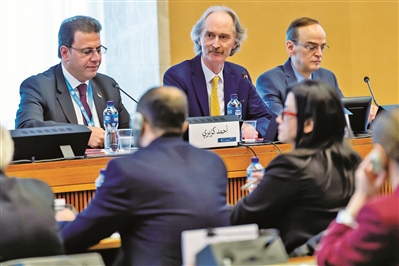
The first plenary session of the Syrian Constitutional Committee concluded in Geneva.
By Wang Jian
On October 30, the Syrian Constitutional Committee convened its first plenary session in Geneva, Switzerland. Representatives from the Syrian government, the opposition and the civil society delegations attended the meeting. After the plenary session, the Constitutional Committee team composed of representatives from the three parties will continue to work in Geneva. This seems to indicate the emergence of the "dawn" of peace in Syria, though the current situation in Syria is still in great uncertainty due to Turkish cross-border operation against the Kurdish militia.
The Syrian Constitutional Committee was established with great difficulty
With the outbreak of the Syrian civil war in 2011, the UN Security Council adopted Resolution 2254 on the situation in Syria on December 18, 2015, emphasizing "the formulation and drafting of a new Syrian constitution for promoting the Syrian political process", in order to facilitate the realization of peace in Syria. In January 2018, the Syrian National Dialogue Congress in Sochi, Russia, decided to establish the Syrian Constitutional Committee, which consists of 150 members, with 50 members nominated by the Syrian government, another 50 by the opposition, and the rest from the civil societies.
On September 23 this year, the Syrian government and the opposition reached a final agreement on the establishment of the Constitutional Committee under the efforts of the United Nations and the international community. UN Secretary-General António Guterres declared the establishment of the Syrian Constitutional Committee at the UN Headquarters in New York.
The establishment of the Syrian Constitutional Committee has taken a long time due to two reasons. On one hand, the conditions for the establishment of the committee began to take shape only after the Syrian government troops have gradually controlled most of the country’s territory. On the other hand, the parties in Syria could not reach a consensus on the constitutional representatives involved, which has taken them nearly two years to negotiate.
At this plenary session, representatives from all parties elaborated their opinions. The process was full of twists and turns. However, the rules of conduct for committee representatives and the working procedures of the co-chair were passed in the end. A Constitutional Committee team of 45 members composed of the three parties’ representatives is committed to conducting specific work.
Russia, Turkey and Iran declare no interference
On October 29, the day before the first plenary session of the Syrian Constitutional Committee, Russian Foreign Minister Sergei Lavrov, Iranian Foreign Minister Javad Zarif, and Turkish Foreign Minister Mevlut Cavusoglu held a closed meeting on the details of the Committee. At the joint press conference held after the meeting, the three foreign ministers issued a joint statement saying that "the three countries have always supported Syria's sovereignty, independence, national unity and territorial integrity. These principles above should be respected from all relevant respects." Besides, the joint statement also emphasized that foreign countries should not interfere in the work of the Syrian Constitutional Committee, and must not impose any time limit on it from the outside.
The three countries still have troops in Syria, though the Turkish troops have never been invited by the Syrian government. Turkish Foreign Minister said that "when the Syrian regime is fully capable of defending its territory at the end of this political process and capable of wiping out various terrorist organizations in its territory, Turkey will withdraw to return the entire territory to Syria. This is the territory of Syria. Turkey respects the territorial integrity of Syria." Iranian Foreign Minister said that Iran and Russia have deployed troops in Syria at the invitation of the Syrian government, and the troops will stay there as long as the Syrian government allows.
Unstable factors still exist
There are still factors destabilizing the peace process in Syria, in spite of the facts that the Syrian Constitutional Committee has begun to operate and Turkish cross-border operation against the Kurdish militia in Syria has gradually subsided.
First of all, as the Syrian Constitutional Committee commences its specific work, the contradictions and conflicts among the three parties are to be highlighted, and the competition in negotiations may be even more intense, which will thus affect the current situation in Syria.
Secondly, the Turkish troops do not continue to penetrate into the Syrian territory according to the joint memorandum between Russia and Turkey. However, the Turkish troops have always been a major threat for the Syrian government, which serve to disturb Syria’s control over its own territory, and affect the status of the Syrian government in negotiations in the Constitutional Committee. Syrian President Bashar al-Assad said that the agreement between Russia and Turkey has certain positive significance, but is not a long-term solution. President Bashar stressed that "if we could not achieve the results we want through all forms of political means, then there would be no alternative but resorting to war".
Finally, the Kurdish militia has begun to stand closer to the Syrian government, despite of many problems existing between both sides. Left with less say over the Syrian situation, the US will inevitably take measures to roil the situation therein, and extreme organizations including the ISIS may also rise in revolt thereby.













